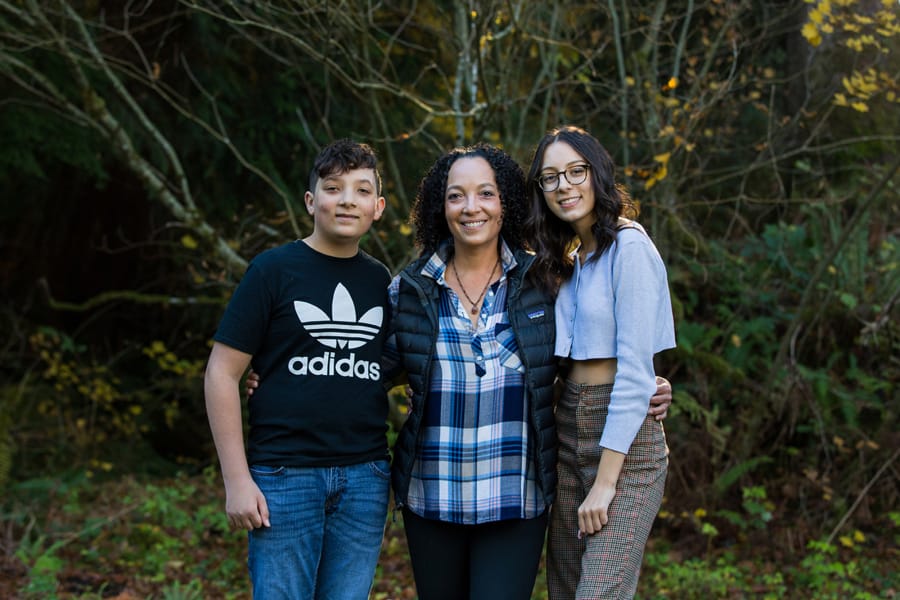Back in March, just as anxiety over COVID-19 began spreading across the U.S., Erinn Baldeschwiler of La Conner, northwest of Seattle, found herself facing her own private dread.
Just 48 and the mother of two teenagers, Baldeschwiler was diagnosed with stage 4 metastatic breast cancer after discovering a small lump — no bigger than a pea — on her chest. Within weeks, it was the size of a golf ball, angry and red. Doctors gave her two years to live.
“It’s heartbreaking,” she said. “Frankly, I was terrified.”
But instead of retreating into her illness, Baldeschwiler is pouring energy into a new effort to help dying patients gain legal access to psilocybin — the mind-altering compound found in so-called magic mushrooms — to ease their psychic pain.
“I have personally struggled with depression, anxiety, anger,” Baldeschwiler said. “This therapy is designed to really dive in and release these negative fears and shadows.”
Dr. Sunil Aggarwal, a Seattle palliative care physician, and Kathryn Tucker, a lawyer who advocates on behalf of terminally ill patients and chairs a psychedelic practice group at Emerge Law Group, are championing a novel strategy that would make psilocybin available using state and federal “right-to-try” laws that allow terminally ill patients access to investigational drugs.
They contend that psilocybin — whether found in psychedelic mushrooms or synthetic copies — meets the criteria for use laid out by more than 40 states and the 2017 Right to Try Act approved by the Trump administration.
“Can you look at the statute and see by its terms that it applies to psilocybin?” Tucker said. “I think the answer is yes.”
Still, the pair admit they’re pushing a legal theory still untested in the courts. “This is untrodden ground,” Aggarwal said.
Last month, Aggarwal, who works at the Advanced Integrative Medical Science Institute, known as AIMS, took the first step toward federal authorization of the substance in Washington state and perhaps across the nation. He submitted an application to manufacture psilocybin to the state’s Pharmacy Quality Assurance Commission, which would allow him to grow psilocybin mushrooms from spores at his clinic and administer them for therapeutic use.
Commission members haven’t yet reviewed the application, but Gordon MacCracken, an agency spokesperson, said there “would be a path” for possible license and use — if the application meets the requirements of state regulators and the federal Drug Enforcement Administration.
Currently, psilocybin use is illegal under federal law, classified as a Schedule 1 drug under the U.S. Controlled Substances Act, which applies to chemicals and substances with no accepted medical use and a high potential for abuse, such as heroin and LSD.
Recently, however, several U.S. cities and states have voted to decriminalize possession of small amounts of psilocybin. Last month, Oregon became the first state to legalize psilocybin for regulated use in treating intractable mental health problems. The first patients will have access beginning in January 2023.
It’s part of a wider movement to rekindle acceptance of psilocybin, which was among psychedelic drugs vilified — and ultimately banned — after the legendary counterculture excesses of the 1960s and 1970s.
“I think a lot of those demons, those fears, have been metabolized in the 50 years since then,” Aggarwal said. “Not completely, but we’ve moved it along so that it’s safe to try again.”
He points to a growing body of evidence that finds that psilocybin can have significant and lasting effects on psychological distress. The Johns Hopkins Center for Psychedelic and Consciousness Research, launched this year, has published dozens of peer-reviewed studies based on two decades of research. They include studies confirming that psilocybin helped patients grappling with major depressive disorder, thoughts of suicide and the emotional repercussions of a cancer diagnosis.
Psilocybin therapy appears to work by chemically altering brain function in a way that temporarily affects a person’s ego, or sense of self. In essence, it plays on the out-of-body experiences made famous in portrayals of America’s psychedelic ’60s.
By getting out of their heads — and separating from all the fear and emotion surrounding death — people experience “being” as something distinct from their physical forms. That leads to a fundamental shift in perspective, said Dr. Ira Byock, a palliative care specialist and medical officer for the Institute for Human Caring at Providence St. Joseph Health.
“What psychedelics do is foster a frame shift from feeling helpless and hopeless and that life is not worth living to seeing that we are connected to other people and we are connected to a universe that has inherent connection,” he said.
“Along with that shift in perspective, there is very commonly a notable dissolution of the fear of dying, of nonexistence and of loss, and that’s just remarkable.”
The key is to offer the drugs under controlled conditions, in a quiet room supervised by a trained guide, Byock said. “It turned out they are exceedingly safe when used in a carefully screened, carefully guided situation with trained therapists,” he said. “Almost the opposite is true when used in an unprepared, unscreened population.”



